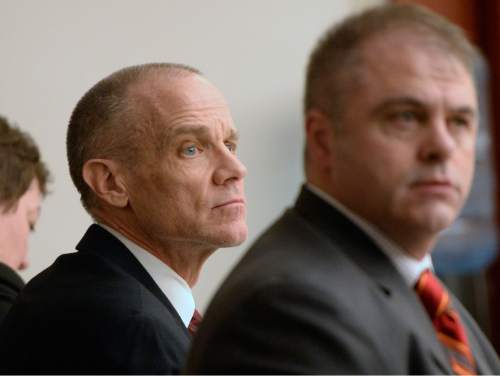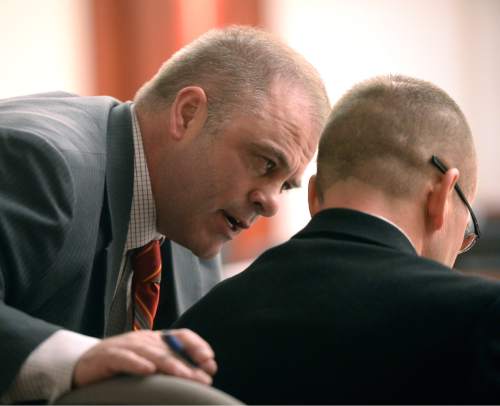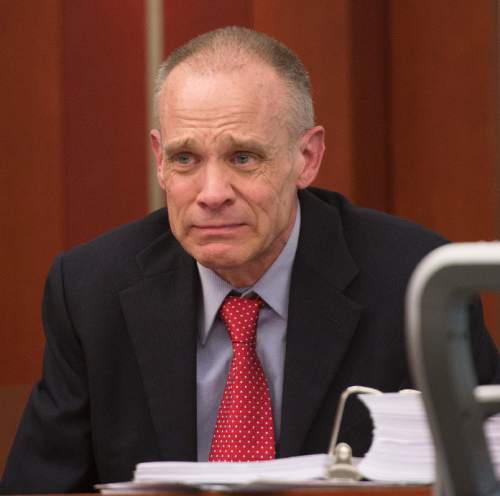This is an archived article that was published on sltrib.com in 2015, and information in the article may be outdated. It is provided only for personal research purposes and may not be reprinted.
Salt Lake County prosecutors must comb through what could be at least a terabyte of data to identify and turn over documents related to the criminal prosecution of a key player in the bribery and corruption scandal that ensnared former Utah Attorneys General Mark Shurtleff and John Swallow.
The directive was handed down Tuesday by a unanimous vote of the Salt Lake County Council during a public records request appeal hearing.
Attorneys for Marc Sessions Jenson sought the documents from Salt Lake County District Attorney Sim Gill's office in December, weeks before the former developer was tried on bribery and money laundering charges in connection with a failed private golf and ski resort near Beaver. He was acquitted Jan. 30.
The case was filed against Jenson in 2011 by the Utah attorney general's office. His attorneys contend Jenson was targeted for prosecution by Shurtleff and Swallow for political reasons.
It's not clear whether the documents could document or support such a hypothesis, but Jenson's defense team wants to know what's contained in the voluminous cache of data, even though the case is closed and Jenson was acquitted.
"We don't know what they are all about; we just know that they exist," said Brad Mumford, one of Jenson's defense attorneys.
Initially, it appeared Gill's office would fulfill the Government Records Access and Management Act (GRAMA) request, saying in a Jan. 2 letter that more time was needed to respond.
On Jan. 23, however, the office denied the GRAMA request, saying the records were protected and not subject to release because doing so might interfere with ongoing investigations and criminal prosecutions.
"This is all related to Shurtleff and Swallow and those ongoing investigations," Gill said Tuesday. "We don't typically give our materials out in a pending investigation to third parties until those matters are concluded."
Releasing the records could jeopardize the right Shurtleff and Swallow have to a fair trial, he said.
Last year, Gill and Davis County Attorney Troy Rawlings filed nearly two dozen felony and misdemeanor charges against Shurtleff and Swallow for an alleged corruption scheme that investigators say included taking bribes to protect big campaign donors who operated businesses that could run into regulatory trouble.
Both have proclaimed their innocence and are set for separate preliminary hearings in June.
In 2013, Jenson became a key figure in the Shurtleff and Swallow investigations when he said the pair had pressured him for money and favors before and after he negotiated a plea agreement in a 2005 securities fraud case.
Defense attorneys subpoenaed Shurtleff and Swallow to testify in Jenson's trial, but a judge declined to force either man to take the stand.
Gill said Tuesday that Jenson's defense team could have sought the records through a subpoena or a judge's order during the trials.
He estimated that his office holds about 2 terabytes — 2,000 gigabytes — of data that have been collected as evidence, which was all made available to the Utah County attorney's office, which handled Jenson's prosecution.
Defense attorneys did raise the issue of the documents at trial. Deputy Utah County Attorney Tim Taylor said he made a cursory search of the data for documents or communications related to Jenson, but it produced minimal results.
Jenson's attorneys have filed similar GRAMA requests with both the Davis County attorney's office, which is prosecuting Shurtleff, and with Utah County. Both requests have been denied and Jenson's attorneys have since filed a petition for judicial review of Utah County's decision in 4th District Court.
Similar action might have been taken against Salt Lake County if the council had denied the appeal, Mumford said after Tuesday's hearing.
During their deliberations, several council members said they were struggling to balance the principles of transparency and open government against the due process rights of criminal defendants whose cases are ongoing.
"I don't want to do anything that would goof up the Shurtleff/Swallow prosecution," said Councilman Michael Jensen. "But if I'm on [Jenson's] side, I want to see what's there."
Under the council's decision, Jenson's team will get only the documents that relate to him, but will also be provided a list of other documents included in the investigative files.









